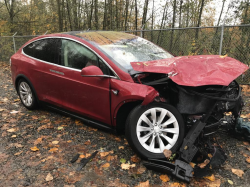
— Tesla acceleration problems are caused by drivers pressing the accelerator pedals and causing alleged sudden unintended acceleration.
That finding comes from the National Highway Traffic Safety Administration (NHTSA) which looked into the problem and denied a formal petition to open an investigation.
In January 2020, NHTSA announced it had received a petition to "recall all [Tesla] Model S, Model X, and Model 3 vehicles produced from 2013 to the present" due to unintended acceleration events that allegedly caused more than 200 crashes.
Safety regulators said they would look into the matter and decide if a safety investigation should be launched.
According to the petition about alleged Tesla acceleration problems, 232 complaints had been submitted to NHTSA, including 203 reporting crashes.
Tesla quickly said the petitioner, Brian Sparks, was wrong to suggest there was anything wrong with the vehicles because all the data indicated otherwise.
In a statement from the automaker, alleged Tesla acceleration problems were discussed with NHTSA on a routine basis and it was determined the vehicles operated as intended.
"In other words, the car accelerates if, and only if, the driver told it to do so, and it slows or stops when the driver applies the brake." - Tesla
Tesla also said the vehicles have two independent position sensors and the system cuts off the motor torque if there are errors. In addition, applying the accelerator pedal and the brake pedal at the same time allegedly overrides the accelerator pedal input.
In denying to open an investigation into acceleration problems, NHTSA said it reviewed all the Tesla complaints and crash allegations, including incidents not referenced in the petition. Regulators also analyzed videos and event data recorders collected from Model S, Model X and Model 3 vehicles.
According to NHTSA, owners may talk about Tesla acceleration problems, but no evidence supports opening a safety defect investigation. In every case where data is available, the evidence shows crashes caused by alleged acceleration problems were caused by "pedal misapplication."
"There is no evidence of any fault in the accelerator pedal assemblies, motor control systems, or brake systems that has contributed to any of the cited incidents. There is no evidence of a design factor contributing to increased likelihood of pedal misapplication. The theory provided of a potential electronic cause of SUA [sudden unintended acceleration] in the subject vehicles is based upon inaccurate assumptions about system design and log data." - NHTSA
Safety regulators say that based on the available information, an investigation into alleged Tesla acceleration problems would not lead to a finding of safety-related defects in the vehicles.




